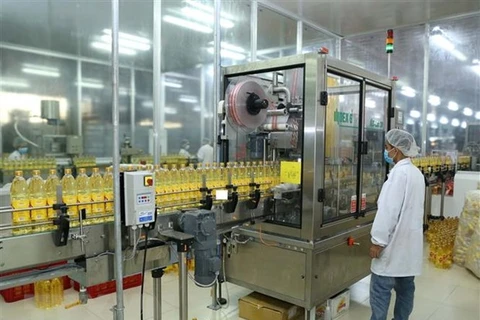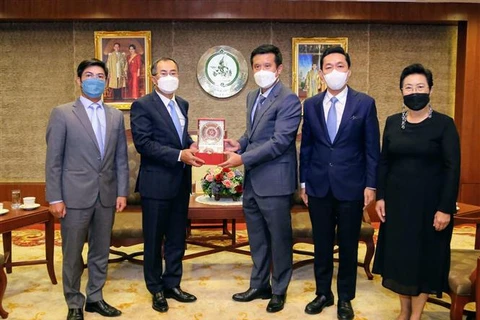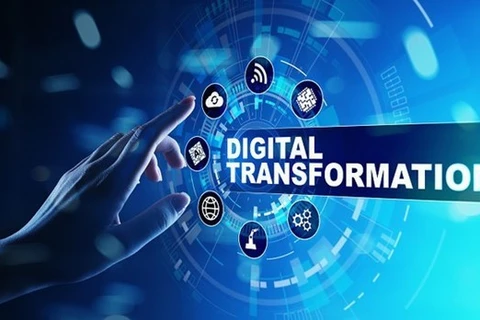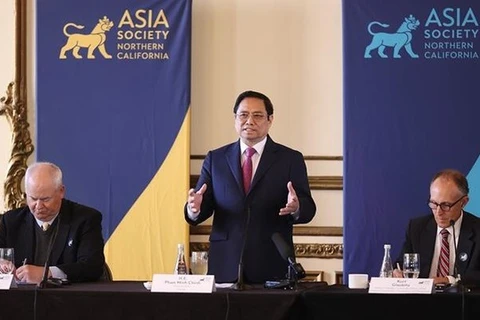 The event takes place over two days with 18 sessions and exhibitions on the theme of digital transformation. (Photo: VietnamPlus)
The event takes place over two days with 18 sessions and exhibitions on the theme of digital transformation. (Photo: VietnamPlus) Hanoi (VNA) - The Vietnam - Asia Digital Transformation Summit (Vietnam - Asia DX Summit) 2022 demonstrates an aspiration to work side by side with the Government, agencies, ministries, sectors, localities and businesses in digital transformation and digital economic development.
The Vietnam - Asia DX Summit 2022 officially kicked off in Hanoi on the morning of May 25, with a focus on digital transformation partnership and digital economic development.
The event, co-organised by the Vietnam Software & IT Services Association (VINASA) and the Ministry of Information and Communications, will be held both in person in Hanoi and virtually via communication channels of VINASA.
More than 150 speakers will join 18 sessions at the event alongside the opening one, covering four topics.
There will be three sessions focusing on digital government, which will give insights into cooperation in digital transformation in ministries and sectors; localities and experience in the field in other Asian countries and territories.
Participants will be able to take part in eight sessions regarding eight major sectors in digital transformation for the sake of the digital economy, including financial-banking, transport - logistics, health care; education; tourism; trade; real estate; and agriculture.
During sessions specialising in digital businesses, small- and medium-sized enterprises (SMEs), manufacturers, digital platforms and computing services will be tabled, as well as digital human resources, start-ups and entrepreneurship ideas.
Two sessions regarding digital transformation in Asia are projected to share information on programmes, experience and successful case studies in the process in 11 regional economies.
In addition to primary sessions, a chain of activities will be held on the sidelines, notably an exhibition on digital solution platforms, business matching that help stakeholders to seek partners via both in-person and online forms, expert consulting and solution introduction session.
Such activities are hoped to share visions, introduce solutions and connect stakeholders in digital transformation.
Addressing the event, VINASA Chairman Nguyen Van Khoa said that joint efforts by all political levels and economic components are needed to realise the target for Vietnam’s digital economy set by the Prime Minister.
He pointed out that resources remain modest and scattered at the moment. Therefore, cooperation between ministries, sectors and localities, together with firms will help build fundamental programmes with clear orientations, policies of openness and optimal digital ecosystems for agencies and organisations in the Southeast Asian nation.
The VINASA Chairman affirmed that enterprises in digital technology are exerting efforts in the development of high quality digital transformation platforms and solutions, research and investment in the application of new technologies like artificial intelligence and blockchain. Efforts are being made in the building of a digital ecosystem supporting agencies, organisations and firms in digital transformation.
Enterprises have committed to standing ready to join hands with the Government, ministries, sectors and localities in digital economic development and digital transformation.
All panel discussions will be held in-person and virtual forms and can be watched online at the website www.live.dxsummit.vn.
The event is expected to draw 3,000 guests participating in person and over 10,000 others via videoconference.
Vietnam’s Internet economy was valued at about 21 billion USD in 2021, contributing to 5 percent of GDP and rising seven-fold from 2015. This showed that despite the COVID-19 pandemic’s impacts, digital transformation has generated strong growth for the digital economy.
The Vietnamese Government targets that the digital economy will make up 20 percent of GDP by 2025.
October 10 has been chosen as National Digital Transformation Day.
The day will be held every year with the aim to accelerate the implementation of the national digital transformation as well as the National Digital Transformation Programme by 2025, with a vision to 2030, and to raise public awareness on the role and benefits of digital transformation.
It is also to promote the participation of the entire political system and population so as to ensure the success of the work./.
























